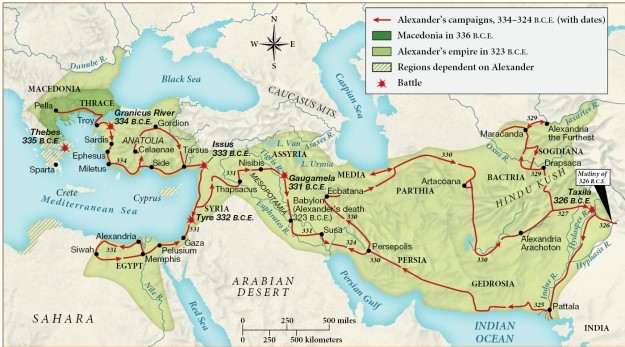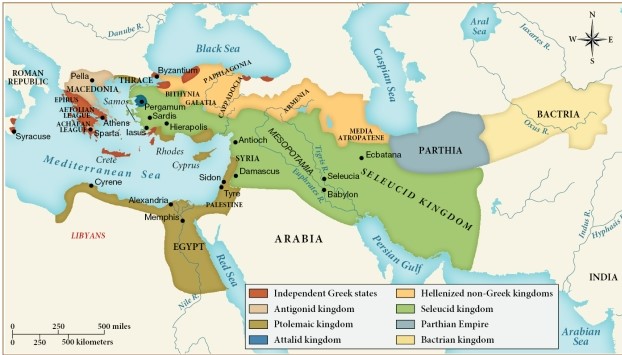Exam 4: From the Classical to the Hellenistic World, 400-30 B.C.E
Exam 1: Early Western Civilization, 400,000-1000 B.C.E65 Questions
Exam 2: Near East Empires and the Reemergence of Civilization in Greece, 1000-500 B.C.E64 Questions
Exam 3: The Greek Golden Age, C 500-C 400 B.C.E65 Questions
Exam 4: From the Classical to the Hellenistic World, 400-30 B.C.E65 Questions
Exam 5: The Rise of Rome and Its Republic, 753-44 B.C.E64 Questions
Exam 6: The Creation of the Roman Empire, 44 B.C.E-284 C.E65 Questions
Exam 7: The Transformation of the Roman Empire, 284-600 C.E64 Questions
Exam 8: The Heirs of Rome: Islam, Byzantium, and Europe, 600-75065 Questions
Exam 9: From Centralization to Fragmentation, 750-105065 Questions
Exam 10: Commercial Quickening and Religious Reform, 1050-115065 Questions
Exam 11: The Flowering of the Middle Ages, 1150-121565 Questions
Exam 12: The Medieval Synthesis and Its Cracks, 1215-134065 Questions
Exam 13: Crisis and Renaissance, 1340-149265 Questions
Exam 14: Global Encounters and the Shock of the Reformation, 1492-156065 Questions
Exam 15: Wars of Religion and the Clash of Worldviews, 1560-164865 Questions
Exam 16: Absolutism, Constitutionalism, and the Search for Order, 1640-170065 Questions
Exam 17: The Atlantic System and Its Consequences, 1700-175065 Questions
Exam 18: The Promise of Enlightenment, 1750-178965 Questions
Exam 19: The Cataclysm of Revolution, 1789-179965 Questions
Exam 20: Napoleon and the Revolutionary Legacy, 1800-183065 Questions
Exam 21: Industrialization and Social Ferment, 1830-185064 Questions
Exam 22: Politics and Culture of the Nation-State, 1850-187065 Questions
Exam 23: Empire, Industry, and Everyday Life, 1870-189065 Questions
Exam 24: Modernity and the Road to War, 1890-191465 Questions
Exam 25: World War I and Its Aftermath, 1914-192965 Questions
Exam 26: The Great Depression and World War II, 1929-194565 Questions
Exam 27: The Cold War and the Remaking of Europe, 1945-1960s64 Questions
Exam 28: Postindustrial Society and the End of the Cold War Order, 1960s-198965 Questions
Exam 29: A New Globalism, 1989 to the Present65 Questions
Select questions type
Please discuss the factors that allowed Philip II and Alexander to build up such an extensive empire.
(Essay)
4.7/5  (39)
(39)
By the 350s B.C.E., which city-state's endless war making and collaboration with the Persians caused so much strife that the weakened Greek city-states could not fend off the Macedonians?
(Multiple Choice)
4.9/5  (35)
(35)
How did the successor kings establish themselves as legitimate rulers of their new kingdoms?
(Essay)
4.8/5  (36)
(36)
Explain why Hellenistic kings' lavish spending on the arts reflected political goals more than artistic ones.
(Essay)
4.8/5  (36)
(36)
How did Socrates stun the trial participants during his trial?
(Multiple Choice)
4.7/5  (41)
(41)
Why did Hellenistic science rarely produce practical results?
(Multiple Choice)
4.8/5  (36)
(36)
In the Hellenistic world, women's social and political status depended largely on which of the following?
(Multiple Choice)
4.9/5  (35)
(35)
Several Hellenistic philosophies agreed that people could free themselves from anxiety about the world around them by
(Multiple Choice)
4.8/5  (35)
(35)
In what order did Alexander embark upon his conquests of the known world, from earliest to latest, according to this map?

(Multiple Choice)
4.9/5  (35)
(35)
Explain the link between Aristotle's distrust of democracy and his views on slavery. Aristotle believed that common sense and the careful observation of nature could explain inequalities in life. Which observations contributed to his belief that women were inferior to men?
(Essay)
4.8/5  (43)
(43)
How did the idea develop that some Hellenistic rulers were divine? Why did people worship them?
(Essay)
4.8/5  (41)
(41)
Hellenistic philosophers almost universally focused on how individuals should pursue inner tranquility to achieve freedom from larger outside forces. This focus stood in sharp contrast to that of classical philosophers, who discussed political, social, and moral issues that affected the community. To what extent did the differing political establishments of the two eras create this difference in approach? Be sure to discuss the emerging philosophical schools of the Hellenistic era in your response, and their ethical teachings in particular.
(Essay)
4.9/5  (35)
(35)
What was Plato's Academy in Athens, established around 386 B.C.E.?
(Multiple Choice)
4.9/5  (46)
(46)
How did wealthy Greek elites in the Hellenistic kingdoms contribute to the common good?
(Multiple Choice)
4.8/5  (33)
(33)
Aristotle (384-322 B.C.E.) rejected Plato's metaphysics, maintaining instead that explanations of the nature of reality must be based on
(Multiple Choice)
4.7/5  (33)
(33)
Why did astrology suddenly become popular in the Hellenistic era?
(Multiple Choice)
4.8/5  (35)
(35)
Which of the following regions likely benefitted the most from trade within the Mediterranean Sea?

(Multiple Choice)
4.7/5  (29)
(29)
Showing 41 - 60 of 65
Filters
- Essay(0)
- Multiple Choice(0)
- Short Answer(0)
- True False(0)
- Matching(0)